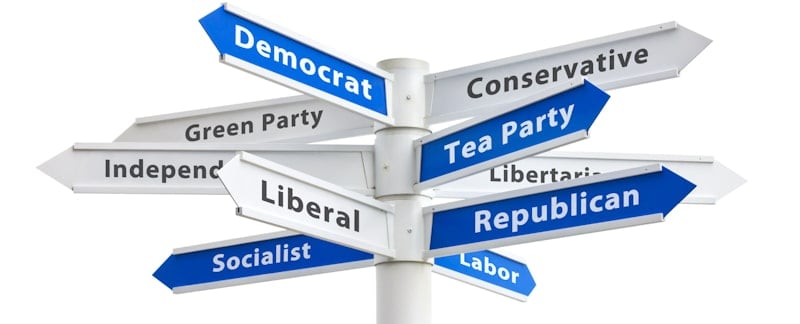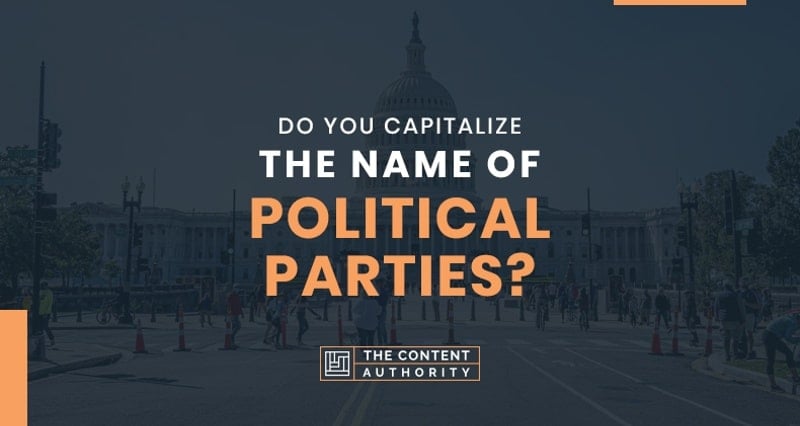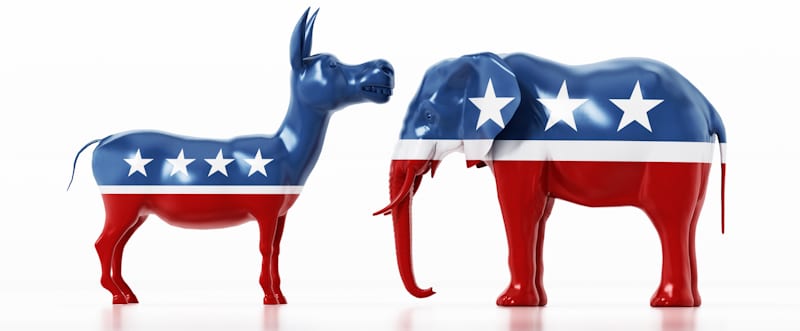Nouns and adjectives denoting actions, ideas, movements, documents, groups, and members of political parties are almost always capitalized. Capitalization of words usually helps differentiate the words from the same terms that are used descriptively. So, should you capitalize the name of specific political parties?
The names of political parties should always be capitalized as they are proper nouns. Even if the name of the party is used to denote someone, it is capitalized. However, if used to describe or refer to someone’s political philosophy, the noun is not capitalized. In short, context matters.
Keep reading to learn what a political party is and divisions in the United States, how names of political parties are capitalized in sentences in general, and lots more.

What is a Political Party?
A political party is an organized group of individuals with similar political objectives and opinions. They seek to influence the people with their aims and views to get their candidates elected to public offices or form a government.
Political parties carry out essential functions within a democratic society, which include:
- Soliciting and communicating public policy concerns and civic requirements and issues as identified by their supporters and members.
- Socializing and enlightening citizens and voters on how the electrical system and politics in general work.
- Negotiating opposing demands and turning them into regular policies.
- Activating and mobilizing people to participate in political movements and decisions and transforming opinions into viable policies.
The above are only a few of the several tasks and responsibilities a politically and socially-aware political party is expected to perform.
The “Democrat” and “Republican” Divide
In America, the terms “Democrat” and “Republican” denote members or supporters of two major political parties: the Democratic Party and the Republican Party.
The English terms “democratic” and “republican” have complex, long histories going far beyond the blue and red states.
The word “democratic” means “the nature of or pertaining to democracy – a type of government wherein the highest power is with the general public and directly exercised by the people or through politicians they elect as representatives. When used in lowercase, “democratic” denotes anything that does with or resembles a democracy. The word “democratic” describes government systems that resemble or are democracies.
The word “republican”, on the other hand, relates to or denotes the nature of a “republic”. Like the word “democratic”, the term “republican” also means things that involve or resemble a particular type of government. The government, in this case, is a “republic”.
A republic is basically a government system wherein the power rests with the people, who indirectly or directly choose their representatives to exercise their political authority.
A republic may not seem any different from a democracy – but there are differences. To keep it short, a “democracy” is a kind of “republic”, but a “republic” is not necessarily a “pure democracy”. In other words, in a republic, the people who get to vote in elections could have been chosen or made eligible for a vote based on curation.
Though the Democratic Party and Republican Party adhere to the principles of democracy and republicanism at their core, they have nothing to do with other political parties outside the United States that have the words “democracy”, “democratic”, or “republic” in their names.
In other words, though the Civic Democratic Party (in various parts of Europe) and Republican People’s Party (in the Middle East) have “democratic” and “republican” in their names, respectively, they have nothing to do with American politics or are not allied with the respective U.S. political parties.
Political Party Names and Capitalization Rules
The phrase “political party” is not capitalized in sentences – regardless of whether it’s used by itself or adjoins a particular political party’s name. However, a political party’s name is always capitalized, along with the word “party”. The following political terms or phrases are always capitalized:
- Democrat
- Russian Social Democratic Labour Party
- German Social Democratic Party
- Republican
- Communist
- Constitutionalist
- Liberal
- Italian Communist Party

The above terms are usually capitalized when they denote a particular political party or members of a party.
General terms that describe political party movements are written in lowercase, provided they do not originate from proper nouns or are not proper names. Typically, the following political terms are not capitalized:
- first lady
- administration
- presidency, presidential
- government
If a political party’s name is used as an adjective, it is capitalized, but there are exceptions. This is usually when the noun is used to describe a person’s political beliefs or standing. For example:
- Mr. Barack Obama belongs to the Democratic Party.
- My grandparents are unwavering Republicans.
If, however, the party name is used to denote political philosophies, it is not capitalized. For example:
- My mom adheres to a republican ideologue.
The term “party” is capitalized or not capitalized based on how it’s used in a sentence or what it denotes. In other words, if it follows a political party’s official name or is a part of the name itself, it is capitalized. However, if it’s used generally, it’s not capitalized. For example:
- She is a member of the Radical Democratic Party.
- A new communist party was launched at the rally.
As mentioned earlier, there are certain cases when political party name-based adjectives could be written in lowercase. This is usually the case when the adjective is placed right before the noun. In one of the sentences above, the adjective “republican” appears right before the noun “ideologue” and is, therefore, in lowercase.
Derivative Words and Capitalization Rules
The name of a philosophy, either in an adjective or noun form, is usually in lowercase if it isn’t derived from a proper name or noun. For example:
- She is a capitalist; she loves capitalism.
The adjective “capitalist” and the noun “capitalism” are derived from the common noun “capital”.
But if the name of a philosophy is a proper name’s derivative, it’s capitalized. For example:
- She is a Marxist; she loves Marxism.
The adjective “Marxist” and the noun “Marxism” are derived from the proper noun, “Marx”.
Also, a political party name or ideology could be capitalized and written in lowercase in the same sentence. For example:
- The Conservative Party member and his conservative Republican senator said they think socialism and democracy don’t go together.
In the sentence above, the noun “conservative” was initially capitalized because it is part of a proper noun or a political party. In the second instance, it isn’t capitalized because it is used as an adjective.
“The” and Capitalization Rules
The article “the” is capitalized when it’s a part of a title or an official name, such as a political party’s name, to attain more distinctness. But when it’s not the official name, it’s written in lowercase.
For example, the name “Democratic Party” has no “the” in its name. However, when the party name is referred to, it almost always has “the” before it. If the name is at the beginning of a sentence, “the” is capitalized: “The Democratic Party is one of the two largest parties in the United States”. But if the party name shows up in the middle of a sentence, “the” is written in lowercase. For example, “The members of the Democratic Party are looking forward to the elections.”
The article “the” always precedes proper nouns, and each time it’s used in a sentence (except for right at the beginning), it’s written in lowercase. For example:
- the Times
- the Washington Post
- the Atlantic Monthly
- the Federal Express
Do You Capitalize “Independent”?
Unlike the Democrat Party, the Republican Party, or even the Green Party in the U.S., independent candidates do not belong to any political party. The term “independent”, therefore, is never capitalized. In fact, the word “independent” is typically used as an adjective – as in “an independent candidate”.
However, if you are using the term “independent” to refer to a member of a particular party, such as the Independence Party of America, the word “independent” is capitalized. That said, the term “independent” is not commonly used to denote the Independence Party members.
Example Sentences with Names of Political Parties
Here is a list of sentences with names of political parties and the term “political party” itself. The different sentences should give you a fair idea of how capitalization rules apply to political parties’ names.
- She was a Social Democratic Party member.
- An agrarian party was newly found at the rally.
- Jim’s mother is a staunch Republican, but he still chose to join the Democratic Party.
- Though she votes for the Republican Party every election, her thoughts are more inclined toward social equality, egalitarianism, environment protection, social safety net strengthening, etc., – which, without a doubt, is democratic.
- The governor belongs to the Democratic Party.
- She is a communist; she loves communism.
- What should one know or do to start a political party?
- This marked the beginning of the political party called the “Democratic Party“.
Conclusion
To capitalize or not is a confusion many people may go through when incorporating political parties’ names in their texts. This is because most of these party names are general terms or are not proper names per se. But because these “general” words take the shape of a proper noun, they become one and are capitalized in writings.
It’s the context in which a political party name or a part or derivative of it appears ascertains whether it gets capitalized. If, for instance, the word “democratic” is not part of the name “Democratic Party” and is used generally or as a descriptor, it will be written in lowercase.
Shawn Manaher is the founder and CEO of The Content Authority. He’s one part content manager, one part writing ninja organizer, and two parts leader of top content creators. You don’t even want to know what he calls pancakes.


